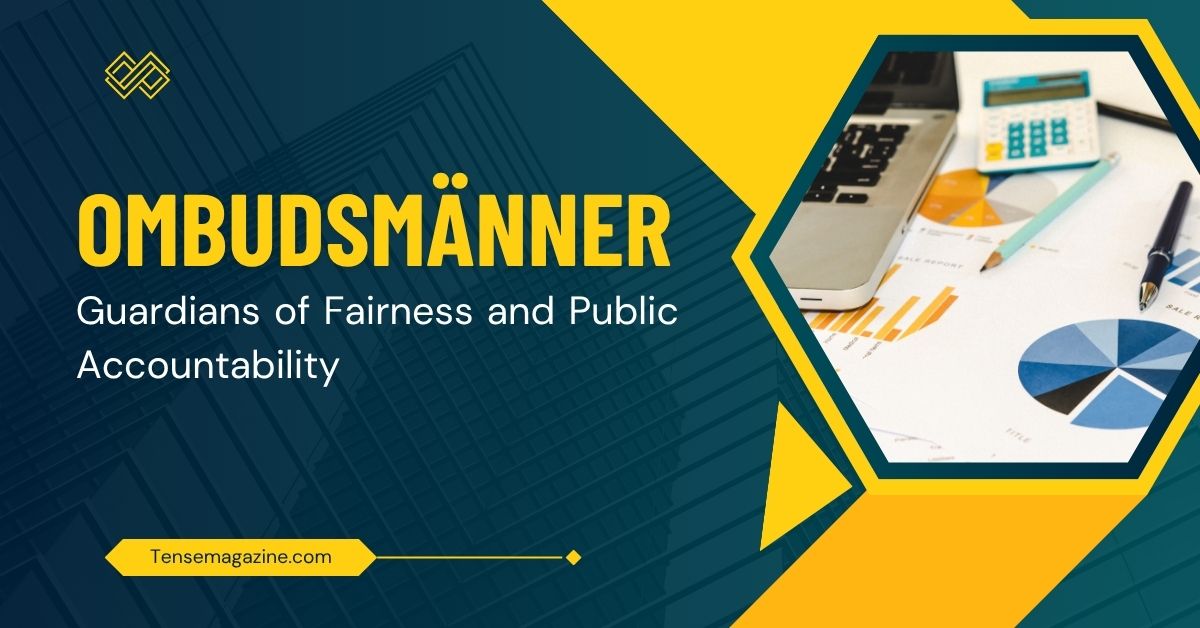Ombudsmänner: Guardians of Fairness and Public Accountability

Ombudsman services are more important in today’s fast-paced, bureaucracy-filled environment. These neutral mediators, known in German as “Ombudsmänner,” mediate disputes between individuals and public organizations. Issues are handled and voices are heard thanks to them. But how precisely do they operate? Their impact goes much beyond administrative tasks, since they are tasked with investigating complaints and offering remedies.
Ombudsmänner expertly and diligently negotiate the intricacies of government in their role as protectors of justice and responsibility. Because of their privileged position, they are able to address systemic issues that the general public may fail to see. There is a lot more to learn about these unsung heroes who operate quietly in the background, whether you are interested in the history of their position or its relevance to modern society.
Let’s dive deeper into understanding who they are and why their presence is essential in promoting justice and good governance!
TRENDING The People-Centered Future of Governance
What is ombudsmänner?
The German plural equivalent of the English word “ombudsman” is “ombudsmänner,” but the singular form is “Ombudsmann” in English. When people have grievances with businesses or government agencies, an ombudsman can mediate a resolution.
They are mostly responsible for looking into citizen concerns. Inadequate service delivery and unjust treatment are common topics of these complaints.
In the absence of bias, an ombudsmann will attempt to mediate or make suggestions to settle disputes out of court. This method encourages honest communication and helps people understand one another.
In addition, they are vital in spotting governmental sector structural issues that could cause service failures or infringement of rights. Not only do they resolve specific issues, but they also help strengthen accountability and governance structures as a whole.
History and Evolution of ombudsmänner
There is a long and storied history to the idea of ombudsmen, or ombudsmänner in German. Originating in the 18th century in Sweden is where it all began. To keep government authorities in check and individuals’ rights safeguarded, the first formal ombudsman was established in 1809.
Similar models were adopted by other nations as the role progressed. Many countries began to see the value of neutral mediators in public service by the middle of the twentieth century. Ombuds offices proliferated as a result of this.
They grew in scope beyond only handling complaints as time went on. In today’s world, ombudsmänner are vital in fostering responsibility and openness in many different fields. Systemic concerns that might lead to rights violations or inadequate service delivery can be better identified with their aid.
Modern ombudsmen have more authority than their forebears had, which allows them to push for better government while also adjusting to new social norms.
Different Types of ombudsmänner
There are many different kinds of ombudsmänner, each one designed to meet the demands of a different industry.
The primary function of government ombudsmen is to resolve complaints pertaining to the management of public affairs. Within government agencies, they guarantee openness and responsibility.
In private companies, ombudsmanns are there to listen to employees’ grievances and address customers’ service problems. Their goal is to cultivate a supportive work environment while boosting customer confidence.
Those who work as educational ombudsmänner are based at educational institutions. They promote equity in educational environments by assisting students who are experiencing problems with academic policies or relationships with professors.
Protecting patients’ rights in healthcare is the primary responsibility of healthcare ombudsmannen. To make sure everyone gets the help they need, they deal with problems like prejudice and insufficient care.
Community ombudsmänner mediate conflicts between citizens and their local government. All of these are vital to ensuring that different parts of society are treated fairly.
Function and Powers of ombudsmänner
Accountability in public services and government institutions is a crucial function of ombudsmänner. They handle grievances from those who feel mistreated or ignored in an unbiased mediator capacity.
Their main responsibility is to conduct comprehensive investigations into these complaints. In order to have a thorough knowledge of the matter, it is necessary to analyze relevant documents, interview relevant persons, and collect evidence.
In addition to handling individual instances, ombudsmänner can also spot issues with the system as a whole. They can identify recurrent problems that may require immediate action by studying patterns in complaints.
In addition, they provide enhancement suggestions grounded on their research. Improvements in service performance and safeguards for people’ rights are common outcomes of such recommendations.
In addition, ombudsmänner are able to lobby for changes in policy as needed. They are able to exert influence over decision-makers while remaining free from administrative constraints due to their unique status.
Importance of ombudsmänner in Society
In order to keep society fair and hold people accountable, ombudsmänner are vital. When people have complaints that the government isn’t paying attention to, they act as a liaison between the two parties.
Ombudsmänner give people a voice by listening to their complaints and offering solutions. As a result, people are more likely to participate in their communities and have faith in government.
They are also useful for spotting systemic problems, which can lead to more extensive changes. Their unbiased studies frequently reveal tendencies that need to be addressed, leading to advances in numerous industries.
In addition, by making businesses answer for their activities, these mediators increase openness. Both the quality of community services and individual rights are protected by this scrutiny.
To simplify, ombudsmänner are crucial champions for equity and justice who make sure everyone’s opinion is heard in the complex bureaucracy. Their presence helps to foster a better educated public and uphold democratic principles.
Role of ombudsmänner in Promoting Good Governance
By mediating disputes between citizens and government agencies, ombudsmänner are vital to the cause of good governance. Citizens are able to express themselves freely without fear of retaliation because of their objective viewpoint.
They make organizations answer for their activities by looking into complaints. Improved connections between residents and authorities are a direct result of the trust that is fostered within communities via this transparency.
On top of that, ombudsmänner find systemic problems that cause unfairness or inefficiency. They aid in the gradual improvement of policies and procedures by dealing with these issues directly.
In many cases, their suggestions result in major shifts that improve service delivery. When given the proper authority, ombudsmänner can serve as change agents, bringing transparency and accountability to government operations.
By championing the rights of citizens and calling for equality amongst people of different socioeconomic backgrounds, their work upholds democratic values.
Challenges Faced by ombudsmänner and How to Overcome Them
The pursuit of justice and fairness is fraught with difficulty for ombudsmänner. A major obstacle is the scarcity of funds. They may not be able to conduct extensive investigations into complaints due to funding constraints.
Also, very few people are aware of this. Many people are confused about who the ombudsman is and how they may use them to have their problems with government services and organizations resolved. Their services go unused because of this chasm.
Opposition from the organizations under investigation is another obstacle. It could be challenging to collaborate with an ombudsman if some people see them as an adversary rather than a mediator.
Outreach initiatives must be implemented in order to address these concerns. More individuals will seek help from ombudsmänner if they are better informed and communicate their functions.
Building stronger relationships with community groups helps to increase confidence in and funding for their initiatives. In order to address problems in a productive rather than defensive manner, it is helpful to build connections.
Conclusion
When it comes to encouraging openness and responsibility across different industries, ombudsmänner are crucial. By mediating complaints and seeing them through to resolution, they play an essential role in connecting the public and institutions.
Service delivery can be greatly enhanced by their unbiased mediation. Omudsmänner play an important role in society by bringing attention to systemic problems and lobbying for solutions that benefit everyone.
At a time when faith in institutions is critical, these people fight for equity. Their presence serves as a reminder to companies to maintain high standards of conduct and promote the rights of citizens.
Maintaining relevant will necessitate adjusting their approaches in response to new difficulties. To effectively manage future challenges, they must embrace innovation while remaining committed to their primary objective.
FAQS
1. What Is the Main Function of an Ombudsman?
Ombudsmen are appointed to investigate complaints against government agencies or services, aiming to mediate disputes or recommend appropriate resolutions.
2. Are Ombudsmänner Independent from the Government?
Yes, they operate independently, allowing them to handle complaints and advocate for citizens’ rights with impartiality.
3. Can Anyone File a Complaint with an Ombudsman?
Generally, yes. Individuals who feel wronged by government services or policies are typically eligible to file complaints with an ombudsmann.
4. How Do Ombudsmänner Help Improve Governance?
They identify systemic issues and offer informed recommendations, contributing to better service delivery and more effective governance.
5. What Challenges Do Ombudsmänner Face in Their Work?
Common challenges include limited resources, resistance from authorities, and ensuring transparency. Overcoming these hurdles requires collaboration and robust support systems.






